Dolphins are among the most popular and beloved marine mammals, often seen leaping and playing in the ocean’s waters. But what do dolphins eat? The answer depends on the habitat of the dolphin. While those living in the wild mainly consume fish, squid, shrimp, and octopus, dolphins living in captivity are typically fed frozen fish.
In this article, I will discuss the dolphin’s diet, hunting skills, and nutritional needs in more detail. So, read on.
What Do Dolphins Eat? [Both in Wild & Captivity]
Dolphins are known to be carnivorous, which means they consume meat. In the wild, the diet of dolphins varies depending on their location, but they typically eat fish, squid, and crustaceans.
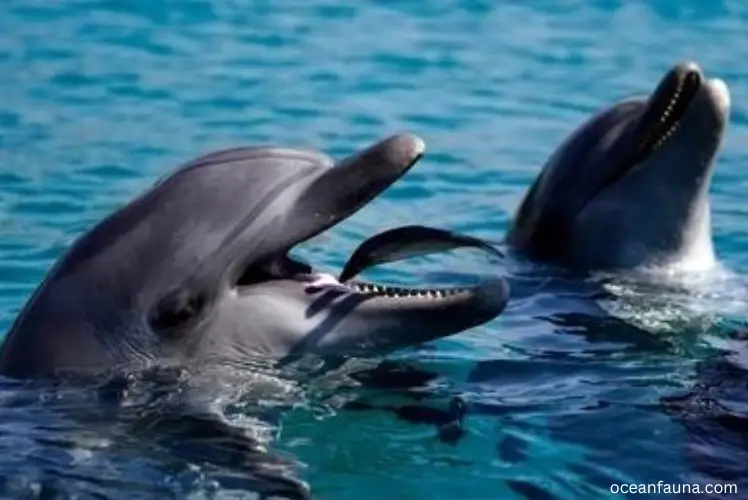
The Atlantic spotted dolphin, being of a smaller size, feeds predominantly on fish, squid, and octopuses. Bottlenose dolphins make up the mid-size range and hunt for larger prey like mackerels, herrings, or salmons.
As if this wasn’t enough to be amazed by nature’s diversity, orcas – the largest species of them all – feast upon sharks, squids, octopuses, sea turtles, penguins, seals, sea lions, and even seabirds.
In captivity, however, dolphins’ diet is more controlled and diversely composed since they cannot access their natural prey in the wild. Their diet usually includes herring, mackerel, squid, and krill. Zoos and marine parks also add vitamin supplements to their meals to ensure that they receive complete nutrition.
It’s worth noting that some marine parks and aquariums feed their dolphins a mix of frozen fish and fortified gelatin blocks, which can raise concerns about the nutritional value of the food. Nevertheless, these establishments maintain control over the diet of their dolphins to ensure optimal health and high performance standards.
How Do Dolphins Eat? [Digestive System & Hunting Skills]
Dolphins are known to be highly intelligent marine mammals that can easily adapt to their environment. Like other mammals, their digestive system comprises a mouth, throat, stomach, and intestines. However, their digestive tract is shorter than other mammals with similar body sizes. This helps them digest food faster, allowing them to hunt more efficiently.
Dolphins are carnivorous, and their diet mainly consists of fish, squid, and other marine creatures. They have sharp teeth that help them capture their prey. They use their echolocation ability to locate their prey and detect obstacles while hunting.
Once they locate their prey, they use their speed to chase and catch them. They can reach up to 60 kilometers per hour, making them one of the fastest marine predators.
Dolphins have a unique way of hunting called “herding.” They work together to corral schools of fish into a tight ball or circle. This makes it easier for them to catch their prey as they can take turns feeding on the trapped fish. Their highly coordinated and sophisticated hunting strategy makes them highly effective predators.
Once they have caught their prey, dolphins swallow them whole, as they are unable to chew their food due to their simple teeth structure. Their stomach has different chambers that help break down the food and extract the necessary nutrients. Their digestive system is highly efficient, allowing them to metabolize food quickly.
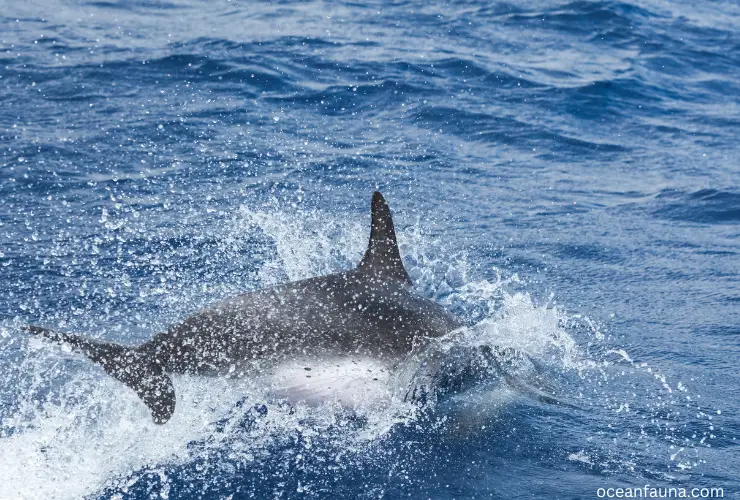
Another way how dolphins catch their prey is by slapping their tails with force to stun them and then eating them.
Are There Any Herbivore Dolphins?
“Are there vegetarian dolphins?” No, there is no herbivore or vegetarian dolphin species. Dolphins are exclusively carnivorous and feed mainly on fish, squid, crustaceans, and other marine animals. As some species of dolphins can grow up to 10 feet long, they require larger prey to sustain themselves.
They hunt for their prey using their speed and echolocation abilities. They also use herding techniques to corral groups of fish into a tight circle, making it easier for them to feed. Dolphins do not rely on plants as a source of food and are therefore classified as carnivores.
How Much Do Dolphins Eat?
Dolphins have a healthy appetite and eat a significant amount of food daily. In the wild, an adult dolphin can consume between 15 to 30 pounds of food each day, approximately 6.8 to 13.5 kg. However, in captivity, dolphins receive more food, each receiving 25 to 35 pounds of fish daily.
Interestingly, the amount of food a dolphin consumes varies depending on its age and body weight. For instance, adult bottlenose dolphins have been observed to eat around 4% to 6% of their body weight in food per day.
This means that a dolphin weighing around 500 pounds may consume up to 30 pounds of food in a single day, while a smaller dolphin weighing around 100 pounds may eat approximately 4 to 6 pounds of food in a day.
What Are the Nutritional Needs of Dolphins?
Dolphins require a balanced and nutrient-rich diet to support their unique physiology and active lifestyle. As obligate carnivores, dolphins primarily consume fish, squid, and crustaceans, but the specific types and amounts of prey vary depending on the species and region.
One essential nutrient that dolphins require is protein, which makes up a significant portion of their diets. In addition to supporting the growth and repair of body tissues, protein is also necessary to produce enzymes, hormones, and other essential molecules.
Dolphins obtain their protein from a variety of sources, including oily fish like mackerel and herring, as well as cephalopods like squid and octopus.
According to a study, wild dolphins need an astounding 33,000 calories a day to sustain their energy – the equivalent of eating 60 servings of salmon.
Another important nutrient for dolphins is fat, which provides energy and insulation. Dolphins require a high intake of omega-3 and omega-6 fatty acids, which are essential for maintaining healthy skin and coat, supporting immune function, and promoting brain development.
Fatty fish like sardines and anchovies are a common source of these important nutrients.
Dolphins also require a range of vitamins and minerals to support their overall health and well-being. Some key vitamins for dolphins include vitamin A, which is important for vision and immune function, and vitamin D, which is necessary for calcium absorption and bone health.
Minerals like calcium, phosphorus, and magnesium are also critical for maintaining strong bones and teeth.
Interestingly, different species of dolphins have slightly different nutritional needs depending on their habitat and hunting strategies. For example, offshore species like the common dolphin typically consume a wider variety of prey, while coastal species like the bottlenose dolphin may rely more heavily on a few specific prey types.
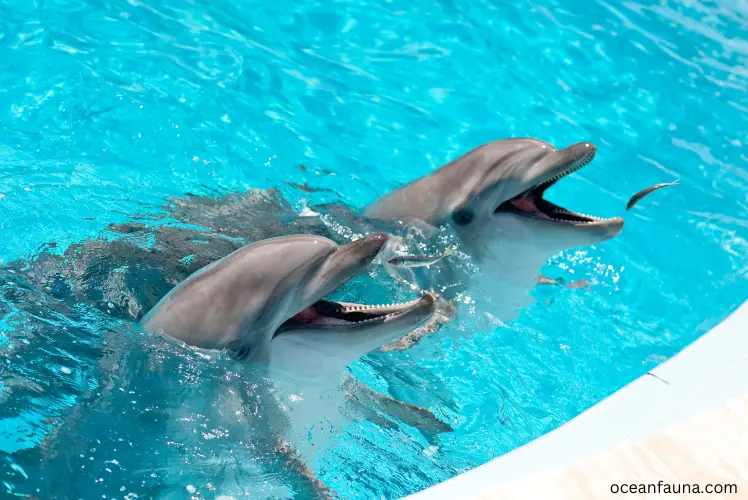
FAQs
Do dolphins eat every day?
Yes, dolphins do eat every day. In fact, they need to consume a significant amount of food every day to maintain their high metabolism and energy needs. As mentioned, dolphins typically consume up to 25 kilograms of fish daily.
However, their diet can vary depending on their location and prey availability. For instance, dolphins living in shallow waters may feed on smaller fish, while those that inhabit deeper waters may consume larger fish and squid.
Do dolphins eat sea turtles?
While some species of dolphins do feed on sea turtles, not all do. In particular, larger dolphin varieties are the ones that most commonly prey upon sea turtles. However, it is not their main food source – just one item amongst many others they may hunt for sustenance.
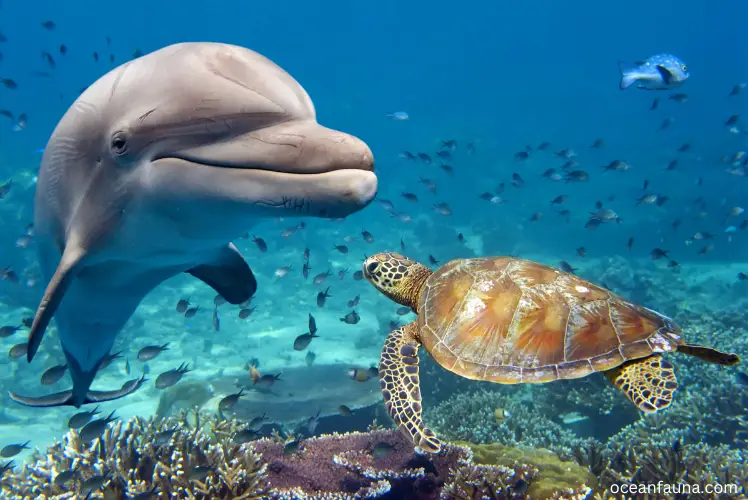
In the case of sea turtles, larger dolphins like the bottlenose dolphin have been observed using different techniques to catch these reptiles. One method involves chasing sea turtles and then ramming them from underneath to flip them over, rendering them helpless. Another method involves using their strong jaws to crush the shells of smaller sea turtles before consuming them.
Do dolphins eat jellyfish?
Yes, dolphins do indeed eat jellyfish. This may surprise some, as jellyfish are known to have stinging tentacles and are considered a danger to humans. However, for dolphins, jellyfish are a part of their natural diet. In fact, some species of dolphins are known to consume large quantities of jellyfish, such as the spotted dolphin.
Jellyfish are a great source of food for dolphins as they are rich in nutrients such as protein and amino acids. Additionally, different species of jellyfish contain varying amounts of fat, which provides an energy source for the dolphins. However, eating jellyfish is not without risk, as some species, such as the box jellyfish, are highly venomous and can be deadly to dolphins and humans.
Dolphins have evolved to deal with the dangers of eating jellyfish. They often use their nose to push the jellyfish around, avoiding the tentacles that can cause harm. They also have specialized teeth and jaws that allow them to crush the jellyfish and remove their toxic tentacles before swallowing them whole.
Do dolphins eat sharks?
Yes, some species of dolphins do eat sharks. In fact, larger dolphins like Orca or killer whales are known to feed on sharks as a regular part of their diet. These dolphins are known for their impressive hunting abilities, and they have also been observed attacking and killing great white sharks to eat their livers, which are rich in nutrients.
Can dolphins eat human food?
Dolphins can eat human food but should not be fed these daily. Dolphins are naturally carnivores; in the wild, they consume fish, squid, and shrimp. When in captivity, fish is their primary source of food. Feeding dolphins human food can cause health problems and even lead to death due to dehydration.
Human food typically contains high levels of salt and preservatives that are harmful to dolphins. They also have different nutritional needs compared to humans, and a diet solely consisting of human food can lead to deficiencies in essential nutrients.
Additionally, dolphins have a unique digestive system that differs from that of humans, making it difficult for them to digest certain foods. Thus, stick to their natural diet and avoid feeding them human food.
Conclusion
Hopefully, now you have a 360-degree knowledge of dolphins’ diets. Let me know if you still have any questions about their feeding. I will answer your question as soon as possible.

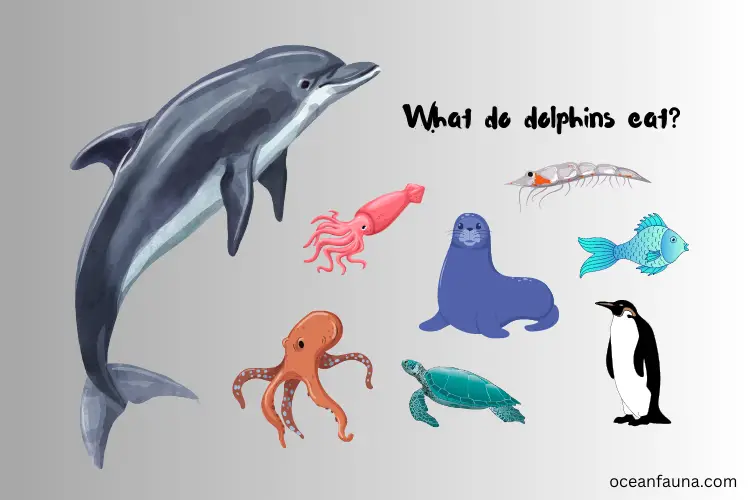
4 thoughts on “What Do Dolphins Eat? (Diet in Wild & Captivity)”